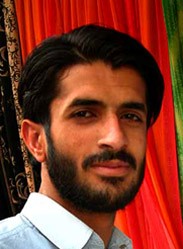Punjabi, Western in Afghanistan

Photo Source:
Steve Evans - Flickr
Creative Commons
|
Send Joshua Project a map of this people group.
|
| People Name: | Punjabi, Western |
| Country: | Afghanistan |
| 10/40 Window: | Yes |
| Population: | 42,000 |
| World Population: | 997,600 |
| Primary Language: | Punjabi, Western |
| Primary Religion: | Islam |
| Christian Adherents: | 0.20 % |
| Evangelicals: | 0.10 % |
| Scripture: | New Testament |
| Ministry Resources: | Yes |
| Jesus Film: | Yes |
| Audio Recordings: | Yes |
| People Cluster: | South Asia Muslim - other |
| Affinity Bloc: | South Asian Peoples |
| Progress Level: |
|
Introduction / History
The name "Punjabi" is used to describe both those who speak Punjabi and those who inhabit the Punjab region in India and Pakistan. Punjabi is an Indo-European language that is divided into six main dialects. One of these is simply called Western Punjabi.
Modern Punjabi culture was largely shaped by the partitioning of India and Pakistan in 1947. This event resulted in massive migrations that separated the Muslims from the Hindus and Sikhs. In general, the Muslim Punjabis live in Pakistan, while the Hindu or Sikhs are in India. One can also find large Punjabi communities in nearly thirty other countries including Afghanistan.
The Western part of Punjab is adjacent to Afghanistan's region where the Pashtuns live. The number of Western Punjabi speakers in Afghanistan changes depending on how peaceful things are in Pakistan and Afghanistan.
What Are Their Lives Like?
While the living conditions of the Punjabis differ greatly from country to country, they have retained much of their traditional culture and language. Though the language is still Western Punjabi, there are cultural differences between each of the three religious affiliations.
Punjabi immigrants have taken on a variety of occupations. Many have excelled as mechanics, construction workers, and business professionals. Others have found work in retail and trade, particularly through small family businesses.
Conflicts between Punjabis usually involve "land, women and water." This means they deem it necessary to control the means by which a person perpetuates his family and property. This kind of thinking affects the Diaspora Punjabis, though they are unlikely to be landowners outside of South Asia.
In traditional Punjabi culture, the men oversee the family possessions, such as land, shops, or other business assets. The women manage the homes. They cook, care for the children, manage the household finances, and take care of any domestic animals.
Among the diaspora Punjabis, newly married couples set up their homes wherever they choose. Parents arrange marriages after extensive discussions.
Muslim Punjabis have no overall system of social control. Instead, each institution (such as business, home, civil administration, religious organization, or political organization) has its own set of laws and disciplinary measures.
What Are Their Beliefs?
Though there are a small number of Hindus and Sikhs among them, most Western Punjabi speakers in Afghanistan Sunni Muslim. "Sunni," is derived from the Islamic term, sunnah, which means "well-trodden path." Sunnis believe that the correct path is that of the majority. They believe that the One, Supreme God, Allah, spoke through his prophet, Mohammed, and taught mankind how to live a righteous life through the Koran and the Hadith. To live a righteous life, you must utter the Shahada (a statement of faith), pray five times a day facing Mecca, fast from sunup to sundown during the month of Ramadan, give alms to the poor, and make a pilgrimage to Mecca if you have the means. Muslims are prohibited from drinking alcohol, eating pork, gambling, stealing, slandering, and making idols. They gather for corporate prayer on Friday afternoons at a mosque, their place of worship.
The two main holidays for Sunni Muslims are Eid al Fitr, the breaking of the monthly fast and Eid al Adha, the celebration of Abraham's willingness to sacrifice his son to Allah.
Sunni religious practices are staid and simple. They believe that Allah has pre-determined our fates; they minimize free will.
What Are Their Needs?
Although there are many Christian resources available in the Punjabi language, very few Muslim Punjabis have been reached with the gospel. There is a great need for church planting teams to begin focusing on the Punjabis no matter where they live.
Prayer Points
Pray for Western Punjabi speakers in Afghanistan to have hearts that are open to the abundant blessings of Jesus Christ.
Pray for their families to prosper financially and spiritually as they experience a relationship with Jesus Christ.
Pray for a movement to Christ among the Western Punjabi people in Afghanistan that will spread joy, peace and salvation.
Pray for a work of the Holy Spirit to renew and enhance Punjabi culture in Afghanistan.
Pray for the Holy Spirit to move among Punjabi family and community leaders to seek his face and enjoy his blessings.